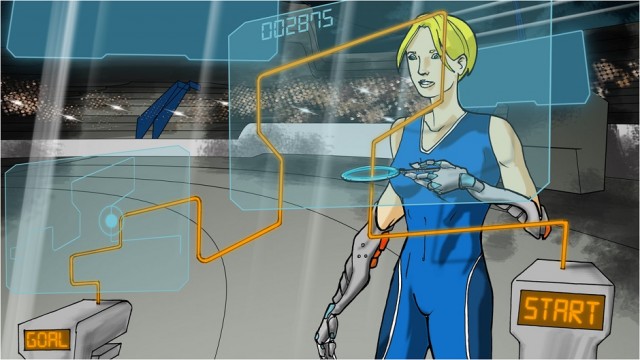Come for the brain-computer interface race, stay for the powered exoskeletons.

Powered arm prosthetics competition graphic.
In October 2016, Switzerland will hold the world’s first-ever Cybathlon, an international olympic competition for athletes who use advanced prosthetics and other modern assistive devices involving robotic technologies.
Hosted by a coalition of Swiss robotics labs, the competition is modeled after the traditional olympic games and will consist of six events. One is a brain-computer interface race where pilots equipped with brain-computer interfaces control an avatar in a racing game played on computers. Another is a functional electrical stimulation bike race where pilots with spinal cord injuries are equipped with functional electrical stimulation devices that enable them to perform a pedaling movement on a cycling device that drives them on a circular course. The competition will also have a leg prosthetics race, a powered exoskeleton race, a powered wheelchair race, and an arm prosthetics race.
According to the Cybathlon website, "The competitions are comprised by different disciplines that apply the most modern powered knee prostheses, wearable arm prostheses, powered exoskeletons, powered wheelchairs, electrically stimulated muscles and novel brain-computer interfaces." For each event, two prizes will be awarded, one to the pilot driving the device and the other to the company that manufactured the device, prosthesis, or software.

Enlarge / Powered exoskeleton race graphic.
Techno-doping? Go ahead
In traditional olympic and paralympic games, participants' equipment is strictly regulated to protect against so-called “technology doping.” Technology doping has been defined as the practice of using “performance enhancing” sporting equipment employing the latest scientific and engineering breakthroughs in order to gain a competitive advantage against the field.
For example, in 2008, there was a great deal of debate about the fairness of athletes wearing the Speedo-designed LZR Racer swimsuit. The suit is said to hug the body up to 70 times tighter than other suits, and, according to The Guardian, 18-time gold medal winning American swimmer Michael Phelps said “I feel like a rocket" when wearing the suit.
However, unlike in the olympics, where athletes can only use prosthetics to make themselves as capable as able-bodied athletes, for Cybathlon participants, pushing the edge of scientific and engineering technologies is entirely the point. As Robert Reiner, principal organizer of the Cybathlon and sensory motor systems professor told us, "We are allowing 'techno-doping' in order to deliver the best possible assistance for paralyzed humans, thus trying to improve their quality of life."
Stated differently, according to the Cybathlon guidelines, it should be next to impossible to game the system.
Growth potential
Reiner described many of the exciting developments related to advanced prosthetics and robotic-based assistive devices in recent years, noting that some technologies that will be featured at the Cybathlon, like powered wheelchairs and functional electrical stimulations to ride a bike, are already quite well-developed.
However, he noted that other technologies that will be featured are in the fairly early development stages, and in some cases have only been proven on a scientific/lab level. "For example, brain computer interfaces work, but only under ideal conditions, with long preparation times, with not high accuracy and reliability." He continued, "Actuated prostheses also work, but leg prostheses are still too weak, too slow and... very difficult to control, so that the users do not accept it."
Reiner explained that there is enormous growth potential in all applications that will be featured, especially with regard to "user friendliness, ergonomics, robustness, [and] acceptance." Given the Cybathlon's stated aim to promote the development of novel assistive systems and reinforce scientific exchange of information, this event should help advance the cause of scientific discovery while also offering a venue for disabled individuals to compete at the athletic vanguard.
No comments:
Post a Comment